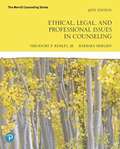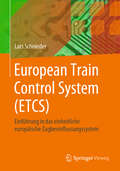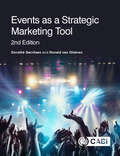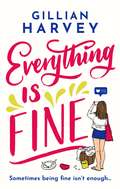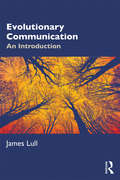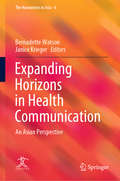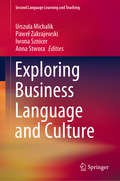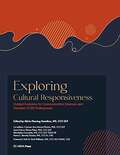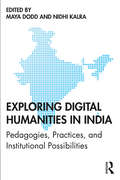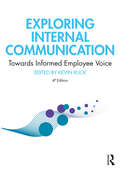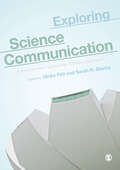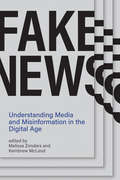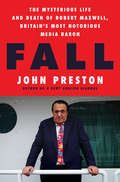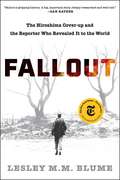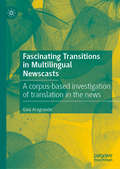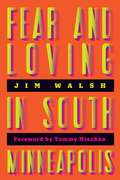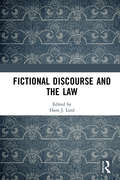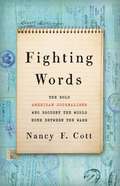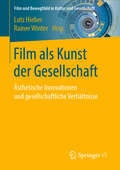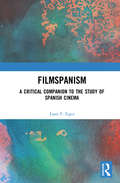- Table View
- List View
Ethical Leadership: Theory To Practice
by Barry L. Boyd Jennifer R. StrongEthical Leadership: Theory to Practice is a unique text that takes students from the big ethical question of “why be moral?” to more specific application of “how to be moral” within the context of leadership. This text covers concepts of moral development and ethical and moral philosophies first, to lay the groundwork for students to understand the underpinnings of ethical leadership. The second section of the text focuses on the application of theory to leadership concepts and competencies.
Ethical, Legal, and Professional Issues in Counseling
by Barbara Herlihy Theodore Phant RemleyEthical, Legal, and Professional Issues in Counseling walks readers through the ethical, legal, and professional challenges they will encounter in their counseling careers. It includes numerous case studies throughout to highlight ethical and legal situations faced by counselors, and it also includes the authors' best thinking and practical advice on how to resolve these situations. The book focuses squarely on the counseling profession, as opposed to psychiatry or other helping professions.
Ethics and Religion in the Age of Social Media: Digital Proverbs for Responsible Citizens
by Kevin Healey Robert H. Woods Jr.Arguing that popular digital platforms promote misguided assumptions about ethics and technology, this book lays out a new perspective on the relation between technological capacities and human virtue. The authors criticize the “digital catechism” of technological idolatry arising from the insular, elite culture of Silicon Valley. In order to develop digital platforms that promote human freedom and socio-economic equality, they outline a set of five “proverbs” for living responsibly in the digital world: (1) information is not wisdom; (2) transparency is not authenticity; (3) convergence is not integrity; (4) processing is not judgment; and (5) storage is not memory. Each chapter ends with a simple exercise to help users break through the habitual modes of thinking that our favorite digital applications promote. Drawing from technical and policy experts, it offers corrective strategies to address the structural and ideological biases of current platform architectures, algorithms, user policies, and advertising models. This book will appeal to scholars and graduate and advanced undergraduate students investigating the intersections of media, religion, and ethics, as well as journalists and professionals in the digital and technological space.
Europawahlkampf 2019: Zur Rolle der Medien
by Christina Holtz-BachaDer Band versammelt Beiträge, die Befunde aus Untersuchungen zum Europawahlkampf 2019 in und mit den traditionellen und den neuen Medien präsentieren. In Anbetracht des Erstarkens rechtspopulistischer Parteien und des Nationalismus galt die Europawahl 2019 als Schicksalswahl für Europa, was für den Wahlkampf ein besonderes Engagement auf Seiten der Politik wie auch der Medien erwarten ließ. Gegenüber dem Europawahlkampf 2014 kam zudem den sozialen Netzwerken gesteigerte Bedeutung zu, die den politischen Akteuren ein zusätzliches Kampagneninstrument bieten, aber auch den Wahlkampf abseits der öffentlichen Beobachtung ermöglichen.
European Train Control System: Einführung in das einheitliche europäische Zugbeeinflussungssystem (Essentials Ser.)
by Lars SchniederDieses Buch ist eine strukturierte Einführung in das europaweit einheitliche Zugbeeinflussungssystem ETCS (European Train Control System). Der Autor führt in die Motivation und Rechtsgrundlagen des ETCS ein. Der Aufbau der unterschiedlichen Ausrüstungsstufen wird dargestellt und die einzelnen Komponenten der Fahrzeug- und Streckeneinrichtung beschrieben. Die umfassende Darstellung der technischen Grundprinzipien des ETCS umfasst sowohl die Sicherungsfunktionen als auch ihre Umsetzung in den unterschiedlichen Betriebsarten. Die Kenntnis dieser technischen Zusammenhänge schafft ein Verständnis, wie ETCS zukünftig einen Beitrag für einen sicheren, wirtschaftlichen und leistungsfähigen Bahnbetrieb leisten kann.
Events as a Strategic Marketing Tool (Tourism Studies)
by Dorothé Gerritsen Ronald van OlderenEvents have come to play an ever-growing role in marketing; by connecting products and services with experiences and vice versa, producers can create important added value. Events as a Strategic Marketing Tool, 2nd edition describes how events can be used as a strategic tool in marketing practices. Fully updated and with new case studies throughout, this second edition reviews the way organizations use events to connect with their visitors. It covers the development of the experience economy, the steps from strategy to concept, event design and touchpoints. It also considers the areas of marketing within which experiences play a role, such as branding, relationship marketing and city marketing. Concluding with a chapter on effect measurement and evaluation, and including a wealth of internationally relevant examples, the book gives a thorough insight into the way events can help reach strategic marketing goals. With coverage of a wide range of marketing areas, the book also includes content on cutting-edge topics such as neuromarketing, providing students with a comprehensive introduction to using events as part of the marketing mix. Contains numerous international examples that showcase the variety of ways that events can be used A wealth of images illustrate the theory, helping students to visualize concepts and improve understanding. This new edition provides an engaging resource for both students and professionals interested in leisure, tourism and events.
Everything is Fine: The funny, feel-good and uplifting page-turner you won't be able to put down!
by Gillian Harvey'Just the escapism we need right now' EVENING STANDARD'Hilarious and relatable' WOMAN'A perfect weekend read' GRAZIAJessica Bradley has it all: the perfect boyfriend; influential healthy-eating blog; successful PR company and wonderful daughter, Anna. Or at least that is what her thousands of followers believe.The truth is, her boyfriend just broke up with her in four words on a post-it; her zest for healthy-eating has all but disappeared; her PR success is all reliant on her now not-so-honest online-life and she just got caught eating her daughter's Coco-Pops. So as they say: fake it 'til you make it. A few little white lies and phoney smiling selfies and Jess can keep up appearances. But when her real-life starts to spiral out of control how can Jess tell the truth from the lies? And will she be able to seize real happiness when it is right in front of her?Hilarious, heart-warming and oh-so relatable, Everything Is Fine is perfect for fans of Louise Pentland, Anna Bell and Lindsey Kelk.'Funny and uplifting' BELLA'Hilarious, heartwarming and relatable' NEW! Magazine'Made me laugh out loud so many times!' Lucy Vine'Feel-good, funny, and very relatable' Anna Bell'Funny and honest' Elizabeth Buchan
Everything is Fine: The funny, feel-good and uplifting page-turner you won't be able to put down!
by Gillian Harvey'Just the escapism we need right now' EVENING STANDARD'Hilarious and relatable' WOMAN'A perfect weekend read' GRAZIAJessica Bradley has it all: the perfect boyfriend; influential healthy-eating blog; successful PR company and wonderful daughter, Anna. Or at least that is what her thousands of followers believe.The truth is, her boyfriend just broke up with her in four words on a post-it; her zest for healthy-eating has all but disappeared; her PR success is all reliant on her now not-so-honest online-life and she just got caught eating her daughter's Coco-Pops. So as they say: fake it 'til you make it. A few little white lies and phoney smiling selfies and Jess can keep up appearances. But when her real-life starts to spiral out of control how can Jess tell the truth from the lies? And will she be able to seize real happiness when it is right in front of her?Hilarious, heart-warming and oh-so relatable, Everything Is Fine is perfect for fans of Louise Pentland, Anna Bell and Lindsey Kelk.'Funny and uplifting' BELLA'Hilarious, heartwarming and relatable' NEW! Magazine'Made me laugh out loud so many times!' Lucy Vine'Feel-good, funny, and very relatable' Anna Bell'Funny and honest' Elizabeth Buchan
Evolutionary Communication: An Introduction
by James LullEvolutionary Communication presents the first comprehensive evolutionary approach to the study of human communication. Presuming no specialized knowledge of evolutionary theory, this reader-friendly textbook explains why and how communication became the determining factor in human development. Drawing from the latest scientific research, Evolutionary Communication represents a truly groundbreaking contribution to Communication Studies as a field of study. Opening up an inspiring new approach for teaching communication, the book can be used as a core volume or supplemental text for courses ranging from Introduction to Communication and Communication Theory to special topics and graduate seminars.
Expanding Horizons in Health Communication: An Asian Perspective (The Humanities in Asia #6)
by Bernadette Watson Janice KriegerThis book explores the ways in which Eastern and Western medical knowledge inform each other in the treatment of people in Asia across a wide range of health issues. To do so, it brings together health communication scholars from diverse disciplines both in Hong Kong and worldwide and combines their observations and expertise with those of clinicians working in healthcare in Asia to provide a topical portrait of the expanding horizons of healthcare in Asia. Social scientists and clinicians discuss their research and clinical practice respectively using a range of analytic approaches that include traditional qualitative and quantitative methodologies, as well as cutting-edge computer diagnostics that digitally visualize health interactions across time. The book presents an innovative and interdisciplinary investigation of Eastern and Western perspectives on healthcare in Asia. It covers topics concerned with a range of mental and physical problems that are currently confronting Asia. Importantly, the views and experiences of front line clinicians delivering patient care in Asia are also included. Accordingly, the book offers varied and innovative perspectives on health communication issues in China, Singapore, Bangladesh and Australia.
Exploring Business Language and Culture (Second Language Learning and Teaching)
by Paweł Zakrajewski Urszula Michalik Iwona Sznicer Anna StworaThis book aims to present the results of research in the sphere of business language and culture, as well as the experience of pedagogical staff and practitioners concerned with broadly understood business. The highly complex nature of contemporary business environment, approached from both the theoretical and practical standpoint, does not cease to prove that research into business studies cannot be dissociated from the cultural and linguistic context. The chapters included in this book were contributed by academics and practitioners alike, which offers a balanced approach to the topic and ensures high levels of diversity together with an undeniable homogeneity. They were gathered with a view to show various aspects of business language, perceived both as a medium of communication and as a subject of research and teaching. They are concerned with business culture as well, including business ethics and representations of business in popular culture. Owing to its multidisciplinary approach, the book presents a roadmap towards successful functioning in business settings, highlighting such issues as education for business purposes, the study of language used in business contexts, the aspects of cross-cultural communication, as well as ethical behaviour based upon different values in multicultural business environments. Given its multifarious character, the book surely appeals not only to academics, but also to the interested laymen and students who wish to expand their knowledge of business studies and related phenomena.
Exploring Cultural Responsiveness: Guided Scenarios for Communication Sciences and Disorders (CSD) Professionals
by Alicia Fleming HamiltonCultural and linguistic competence is as important to the successful provision of services as are scientific, technical, and clinical knowledge and skills. ASHA's Multicultural Issues Board has compiled this collection of thought-provoking, guided scenarios for audiologists and speech-language pathologists. This personal workbook will expand upon the knowledge that you have about the relationships between culture, communication, language, and clinical practice, and will challenge the ways you think about how culture impacts every aspect of your professional work. Although situations are never exactly the same, the accompanying reflective questions and evidence-based resources will better prepare you to identify your own biases and improve your clinical service to your students/patients/clients.
Exploring Digital Humanities in India: Pedagogies, Practices, and Institutional Possibilities
by Nidhi Kalra Maya DoddThis book explores the emergence of digital humanities in the Indian context. It looks at how online and digital resources have transformed classroom and research practices. It examines some fundamental questions: What is digital humanities? Who is a digital humanist? What is its place in the Indian context? The chapters in the volume: • study the varied practices and pedagogies involved in incorporating the ‘digital’ into traditional classrooms; • showcase how researchers across disciplinary lines are expanding their scope of research, by adding a ‘digital’ component to update their curriculum to contemporary times; • highlight how this has also created opportunities for researchers to push the boundaries of their pedagogy and encouraged students to create ‘live projects’ with the aid of digital platforms; and • track changes in the language of research, documentation, archiving and reproduction as new conversations are opening up across Indian languages. A major intervention in the social sciences and humanities, this book will be of great interest to scholars and researchers of media studies, especially new and digital media, education, South Asian studies and cultural studies.
Exploring Internal Communication: Towards Informed Employee Voice
by Kevin RuckExploring Internal Communication has long been the go-to publication for internal communication, public relations and human resources practitioners who want their practice to be grounded in research and guided by evidence-based advice. The new fourth edition has been comprehensively updated throughout to reflect the latest practices in internal communication. Notably, the use of social media within organisations is covered in recognition of the increasing integration of digital platforms such as Workplace by Facebook, Slack and Yammer. A greater understanding of the different communication roles played by line managers and senior managers is emerging, and this is explored to help those managers understand what is expected of them and how to succeed as they communicate within this changing environment. And, the demands of channel management are becoming increasingly complex; this edition helps practitioners negotiate this complexity. Enriched with models, tips and case studies, this book is an indispensable tool for both students and practitioners alike.
Exploring Science Communication: A Science and Technology Studies Approach
by Ulrike Felt Sarah R. DaviesExploring Science Communication demonstrates how science and technology studies approaches can be explicitly integrated into effective, powerful science communication research. Through a range of case studies, from climate change and public parks to Facebook, museums, and media coverage, it helps you to understand and analyse the complex and diverse ways science and society relate in today’s knowledge intensive environments. Notable features include: A focus on showing how to bring academic STS theory into your own science communication research Coverage of a range of topics and case studies illustrating different analyses and approaches Speaks to disciplines across Media & Communication, Science & Technology Studies, Health Sciences, Environmental Sciences and related areas. With this book you will learn how science communication can be more than just about disseminating facts to the public, but actually generative, leading to new understanding, research, and practices.
Exploring Science Communication: A Science and Technology Studies Approach
by Ulrike Felt Sarah R. DaviesExploring Science Communication demonstrates how science and technology studies approaches can be explicitly integrated into effective, powerful science communication research. Through a range of case studies, from climate change and public parks to Facebook, museums, and media coverage, it helps you to understand and analyse the complex and diverse ways science and society relate in today’s knowledge intensive environments. Notable features include: A focus on showing how to bring academic STS theory into your own science communication research Coverage of a range of topics and case studies illustrating different analyses and approaches Speaks to disciplines across Media & Communication, Science & Technology Studies, Health Sciences, Environmental Sciences and related areas. With this book you will learn how science communication can be more than just about disseminating facts to the public, but actually generative, leading to new understanding, research, and practices.
Fake News: Understanding Media and Misinformation in the Digital Age (Information Policy)
by Kembrew McLeod Melissa ZimdarsNew perspectives on the misinformation ecosystem that is the production and circulation of fake news.What is fake news? Is it an item on Breitbart, an article in The Onion, an outright falsehood disseminated via Russian bot, or a catchphrase used by a politician to discredit a story he doesn't like? This book examines the real fake news: the constant flow of purposefully crafted, sensational, emotionally charged, misleading or totally fabricated information that mimics the form of mainstream news. Rather than viewing fake news through a single lens, the book maps the various kinds of misinformation through several different disciplinary perspectives, taking into account the overlapping contexts of politics, technology, and journalism.The contributors consider topics including fake news as “disorganized” propaganda; folkloric falsehood in the “Pizzagate” conspiracy; native advertising as counterfeit news; the limitations of regulatory reform and technological solutionism; Reddit's enabling of fake news; the psychological mechanisms by which people make sense of information; and the evolution of fake news in America. A section on media hoaxes and satire features an oral history of and an interview with prankster-activists the Yes Men, famous for parodies that reveal hidden truths. Finally, contributors consider possible solutions to the complex problem of fake news—ways to mitigate its spread, to teach students to find factually accurate information, and to go beyond fact-checking.ContributorsMark Andrejevic, Benjamin Burroughs, Nicholas Bowman, Mark Brewin, Elizabeth Cohen, Colin Doty, Dan Faltesek, Johan Farkas, Cherian George, Tarleton Gillespie, Dawn R. Gilpin, Gina Giotta, Theodore Glasser, Amanda Ann Klein, Paul Levinson, Adrienne Massanari, Sophia A. McClennen, Kembrew McLeod, Panagiotis Takis Metaxas, Paul Mihailidis, Benjamin Peters, Whitney Phillips, Victor Pickard, Danielle Polage, Stephanie Ricker Schulte, Leslie-Jean Thornton, Anita Varma, Claire Wardle, Melissa Zimdars, Sheng Zou
Fall: The Mysterious Life and Death of Robert Maxwell, Britain's Most Notorious Media Baron
by John PrestonCosta Prize Winner: The “best biography yet” of notorious media mogul Robert Maxwell, “by turns engrossing, amusing, and appalling” (Sunday Times).In February 1991, Robert Maxwell triumphantly sailed into New York Harbor on his yacht, the Lady Ghislaine, to buy the ailing Daily News. Taxi drivers stopped their cabs to shake his hand, children asked for his autograph, and patrons of the hottest restaurant in Manhattan gave him a standing ovation while he dined. Ten months later, Maxwell disappeared off that same yacht in the middle of the night and was later found dead in the water. As John Preston, author of A Very English Scandal, reveals in this biography, Maxwell’s death was as mysterious as his remarkable life.A tightly paced, addictive saga of ambition, hubris, narcissism, greed, power, and intrigue, this book recounts Maxwell’s rise and fall and rise and fall again. Preston moves backward and forward in time to examine the forces that shaped Maxwell, from his Jewish childhood in occupied Eastern Europe to his failed political ambitions in the 1960s that ended in accusations of financial double-dealing to his resurrection as a media mogul—and the family legacy he left behind, including his daughter Ghislaine Maxwell. Preston chronicles Maxwell’s all-encompassing rivalry with Rupert Murdoch—a battle that ruined Maxwell financially, threatened his sanity, and led, indirectly, to his death. Did Maxwell have a heart attack and fall overboard? Was his death suicide? Or was he murdered—possibly by Mossad or the KGB? Few in the twentieth century journeyed as far from his roots as Robert Maxwell. Yet, as Fall reveals, no one, however rich and powerful, can entirely escape their past. “Preston tells [the story] with great verve and the benefit of extensive interviews.” —The Economist“The mystery of this larger-than-life figure is perplexing—true crime aficionados will be absorbed.” —Library Journal“One of the most enigmatic figures in the annals of white-collar crime . . . well-researched, compelling.” —Kirkus Reviews
Fallout: The Hiroshima Cover-up and the Reporter Who Revealed It to the World
by Lesley M.M. BlumeNew York Times bestselling author Lesley M.M. Blume reveals how one courageous American reporter uncovered one of the deadliest cover-ups of the 20th century—the true effects of the atom bomb—potentially saving millions of lives. Just days after the United States decimated Hiroshima and Nagasaki with nuclear bombs, the Japanese surrendered unconditionally. But even before the surrender, the US government and military had begun a secret propaganda and information suppression campaign to hide the devastating nature of these experimental weapons. The cover-up intensified as Occupation forces closed the atomic cities to Allied reporters, preventing leaks about the horrific long-term effects of radiation which would kill thousands during the months after the blast. For nearly a year the cover-up worked—until New Yorker journalist John Hersey got into Hiroshima and managed to report the truth to the world. As Hersey and his editors prepared his article for publication, they kept the story secret—even from most of their New Yorker colleagues. When the magazine published &“Hiroshima&” in August 1946, it became an instant global sensation, and inspired pervasive horror about the hellish new threat that America had unleashed. Since 1945, no nuclear weapons have ever been deployed in war partly because Hersey alerted the world to their true, devastating impact. This knowledge has remained among the greatest deterrents to using them since the end of World War II. Released on the 75th anniversary of the Hiroshima bombing, Fallout is an engrossing detective story, as well as an important piece of hidden history that shows how one heroic scoop saved—and can still save—the world.
Fascinating Transitions in Multilingual Newscasts: A corpus-based investigation of translation in the news
by Gaia AragrandeThis book combines methods including Critical Discourse Analysis (CDA), Corpus Linguistics and comparative analysis in order to grasp the complexities and ramifications of multilingual broadcasting journalism in different national and supranational contexts. Starting with the idea that both journalism and translation are multi-layered objects and may conceal power dynamics and struggles within society, the author uses a theoretical and methodological convergence framework to analyse examples from Italy, the UK and Europe, as well as calling for larger and more systematic studies about language transfer activities in the news. This book will be of interest to students and scholars of translation, corpus linguistics, journalism and CDA.
Fear and Loving in South Minneapolis
by Jim WalshA veteran Twin Cities journalist and raconteur summons the life of the city after reporting and recording its stories for more than thirty years Two or three times a week, as a columnist, hustling freelance writer, and genuinely curious reporter, Jim Walsh would hang out in a coffee shop or a bar, or wander in a club or on a side street, and invariably a story would unfold—one more chapter in the story of Minneapolis, the city that was his home and his beat for more than thirty years. Fear and Loving in South Minneapolis tells that story, collecting the encounters and adventures and lives that make a city hum—and make South Minneapolis what it is. Here is a man who drives around Minneapolis in a van that sports a neon sign and keeps a running tally of the soldiers killed in Iraq. Here is another, haunted by the woman he fell in love with, and lost, many years ago at the Minnesota Music Café on St. Paul&’s East Side. Here are strangers on a cold night on the corner of Forty-sixth and Nicollet, finding comfort in each other&’s company in the wake of the shootings in Paris. And here are Walsh&’s own memories catching up with him: the woman who joined him in representing &“junior royalty&” for the Minneapolis Aquatennial when they were both seven years old; the lost friend, Soul Asylum&’s Karl Mueller, recalled while sitting on his memorial bench at Walsh&’s go-to refuge, the Rose Gardens near Lake Harriet. These everyday interactions, ordinary people, and quiet moments in Jim Walsh&’s writing create an extraordinary picture of a city&’s life. James Joyce famously bragged that if Dublin were ever destroyed, it could be rebuilt in its entirety from his written works. The Minneapolis that Jim Walsh maps is more a matter of heart, of urban life built on human connections, than of streets intersecting and literal landmarks: it is that lived city, documented in measures large and small, that his book brings so vividly to mind, drafting a blueprint of a community&’s soul and inviting a reader into the boundless, enduring experience of Fear and Loving in South Minneapolis.
Fictional Discourse and the Law
by Hans J. LindDrawing on insights from literary theory and analytical philosophy, this book analyzes the intersection of law and literature from the distinct and unique perspective of fictional discourse. Pursuing an empirical approach, and using examples that range from Victorian literature to the current judicial treatment of rap music, the volume challenges the prevailing fact–fiction dichotomy in legal theory and practice by providing a better understanding of the peculiarities of legal fictionality, while also contributing further material to fictional theory’s endeavor to find a transdisciplinary valid criterion for a definition of fictional discourse. Following the basic presumptions of the early law-as-literature movement, past approaches have mainly focused on textuality and narrativity as the common denominators of law and literature, and have largely ignored the topic of fictionality. This volume provides a much needed analysis of this gap. The book will be of interest to scholars of legal theory, jurisprudence and legal writing, along with literature scholars and students of literature and the humanities.
Fighting Words: The Bold American Journalists Who Brought the World Home Between the Wars
by Nancy F. CottFrom a Harvard historian, this riveting portrait of four trailblazing American journalists highlights the power of the press in the interwar period. In the fragile peace following the Great War, a surprising number of restless young Americans abandoned their homes and set out impulsively to see the changing world. In Fighting Words, Nancy F. Cott follows four who pursued global news -- from contested Palestine to revolutionary China, from Stalin's Moscow to Hitler's Berlin. As foreign correspondents, they became players in international politics and shaped Americans' awareness of critical interwar crises, the spreading menace of European fascism, and the likelihood of a new war -- while living romantic and sexual lives as modern and as hazardous as their journalism. An indelible portrayal of a tumultuous era with resonance for our own, Fighting Words is essential reading on the power of the press and the growth of an American sense of international responsibility.
Film als Kunst der Gesellschaft: Ästhetische Innovationen und gesellschaftliche Verhältnisse (Film und Bewegtbild in Kultur und Gesellschaft)
by Lutz Hieber Rainer WinterDer Band beschäftigt sich mit dem Kunstbegriff im Hinblick auf Film, wobei es sowohl um ästhetische Theorie als auch um konkrete Werke geht. Das Spektrum umfasst Spielfilme und Dokumentarfilme. Dabei liegt der Schwerpunkt auf den ästhetischen Innovationen des Mediums im Laufe seiner Geschichte und in der Gegenwart. Die Entwicklung visueller Ideen wird auf den historischen und gesellschaftlichen Kontext ihrer Entstehung und Rezeption bezogen. In den Blick geraten Filmautoren, Filmkünstler und Filmbewegungen, die nicht nur im Independent-Film, sondern auch im Mainstream zu finden sind.
Filmspanism: A Critical Companion to the Study of Spanish Cinema
by Juan F. EgeaFilmspanism explores the geopolitics of knowledge involved in academic approaches to Spanish cinema. This companion rethinks the role of disciplinarity, institutionality, and nationality in the study of film by taking into account a rather specific set of contentious issues, intellectual traditions, discursive servitudes, and invested scholarship. To that end, the book explores the topics of art cinema, popular culture, film genre, and transnationalism, always with Spanish cinema as its concrete object of study. An insightful contribution to the study of Spanish cinema, this discussion will be of interest to researchers and graduate students in Hispanic Studies and Film Studies.

